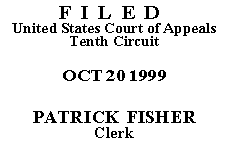

TRANSAMERICA ASSURANCE COMPANY,
Petitioner.
_______________________________
EARL TILLERY, and 469 others individually and on behalf of all others similarly situated,
Plaintiff-Appellee,
v.
TRANSAMERICA ASSURANCE COMPANY, A foreign Insurance Corporation,
Defendant-Appellant,
and
FUTURE PLANNING ASSOCIATES, INC.,
Defendant.
_______________________________
In re: FUTURE PLANNING ASSOCIATES, INC.,
Petitioner.
_____________________________
EARL TILLERY, and 469 others individually and on behalf of all others similarly situated,
Plaintiff-Appellee,
v.
FUTURE PLANNING ASSOCIATES, INC.,
Defendant-Appellant,
and
TRANSAMERICA ASSURANCE COMPANY, a foreign insurance corporation,
Defendant.
The threshold question, however, is whether the district court's remand order is reviewable at all. See SBKC Serv. Corp. v. 1111 Prospect Partners, L.P., 105 F.3d 578, 580 (10th Cir. 1997). In general, a remand ordered on a ground authorized by 28 U.S.C. § 1447(c) "is not reviewable 'on appeal or otherwise.'" Gravitt v. Southwestern Bell Tel. Co., 430 U.S. 723, 723 (1977) (per curiam) (quoting 28 U.S.C. § 1447(d)). The district court remanded on the basis that it lacked federal subject matter jurisdiction under § 1447(c). Our review is therefore limited to determining independently whether the remand order was actually "based to a fair degree upon the court's finding that it lacked subject matter jurisdiction to hear the case," Dalrymple v. Grand River Dam Auth. 145 F.3d 1180, 1184 (10th Cir. 1998) (quotation omitted), cert. denied, 119 S. Ct. 799 (1999), and whether that determination was made in good faith, see Archuleta v. Lacuesta, 131 F.3d 1359, 1362 (10th Cir. 1997). If we find that the district court decided in good faith that it lacked subject matter jurisdiction, then the remand order is otherwise nonreviewable. See Dalrymple, 145 F.3d at 1184; Archuleta, 131 F.3d at 1362.
The district court determined that there was no diversity jurisdiction because the complaint did not establish that the amount in controversy exceeded $75,000, and defendants had failed to set forth specific facts in their notice of removal to show that it did. The district court also determined that there was no federal question jurisdiction because the complaint could be read to state a state-law claim that was not preempted by the Employee Retirement Income Security Act (ERISA), and defendants had failed to set forth specific facts in their notice of removal to support their assertion that plaintiffs' claims were based on an employee welfare benefit plan covered and preempted by ERISA. The district court rejected defendants' motion to amend their pleadings to cure the jurisdictional deficiencies, on the basis that it was required under Laughlin v. Kmart Corp., 50 F.3d 871, 873 (10th Cir. 1995) to assess jurisdiction based on the record that existed at the time of removal.
We find that the district court's remand order was actually based on the absence of federal subject matter jurisdiction. Further, defendants have not shown that the district court's reliance on Laughlin's requirement to assess jurisdiction based on the record at the time of removal was not in good faith. Finally, we are not convinced that the jurisdictional defects in these cases are mere technicalities that justify amendment under Hendrix v. New Amsterdam Cas. Co., 390 F.2d 299 (10th Cir. 1968) and Buell v. Sears, Roebuck & Co., 321 F.2d 468 (10th Cir. 1963).
Therefore, the district court's remand order is nonreviewable, and we lack jurisdiction over these appeals and these mandamus petitions. They are therefore DISMISSED. The mandate shall issue forthwith.
ENTERED FOR THE COURT
PER CURIAM
*. This order and judgment is not binding precedent, except under the doctrines of law of the case, res judicata, and collateral estoppel. The court generally disfavors the citation of orders and judgments; nevertheless, an order and judgment may be cited under the terms and conditions of 10th Cir. R. 36.3.